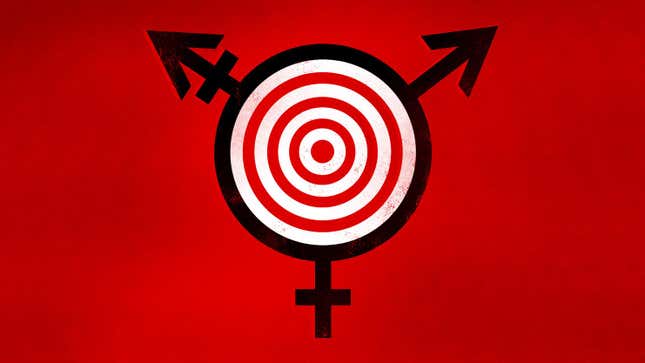Trans People Do Not Endanger Society the Way Society Endangers Trans People
Latest

Rush McKenzie lives in what seems like endless summer, just blocks away from the beach in Santa Barbara, California. His three-story apartment complex—with a stone courtyard and palm trees in every direction—is one of the few Section 8 complexes for low-income workers in a city that’s known to be prohibitively expensive. Many of the residents couldn’t move, even if they wanted to. But where his neighbors might joke that they’re trapped in paradise, McKenzie feels trapped in purgatory—harassed by his neighbors, he says, for being trans. He feels the legal system has sided with his harassers.
By McKenzie’s account, the residents in the apartment next door have stalked and harassed him for over a year. The problems reportedly started last Thanksgiving, when he began wearing men’s clothing. McKenzie, now 35, has been out to friends and family as transgender since he was a teenager. His father was in the Air Force, and like most military families, they moved around a lot, from Denver to Japan. After McKenzie settled in Santa Barbara in 2006, he decided to live publicly as the man he’d known himself to be for two decades. Last year, he started buying men’s t-shirts, as well as a white and green plaid flannel that still hangs in his closet.
His neighbors attend a local non-denominational church popular in the town, one that McKenzie attended prior to coming out, and he claims that the congregation didn’t respond well to his decision to live openly as a trans man. According to McKenzie, he was called everything from a “demon abomination” to a “child molester,” to his face.
McKenzie’s studio (which he shares with his calico, Katniss) shares a wall with two members of the church; he feels that the congregation’s anti-trans stance is an increasingly threatening presence in his life. In the past year, McKenzie claims that church members have threatened to have him evicted from his apartment, kidnap him, beat him, rape him, and murder him.
I spoke to a friend of McKenzie’s who asked to remain anonymous due to safety concerns. She told me that the two met a month and a half ago in a support group, and they talk on the phone regularly. During their conversations, she can hear his neighbors screaming in the background. She often drives McKenzie home after group meetings and walks him to his door to make sure he’s safe. “People stare out the window at us,” she said. She compared the palpable tension to “entering a war zone.”
McKenzie claimed that his landlord didn’t put a stop to the harassment. “He has not been supportive of me,” McKenzie said. “He has been supportive of them.” After nearly a year of constant threats, Mr. McKenzie reported the situation to the police, filing two restraining orders against members of the church on November 3. When the case went before a judge, his landlord showed up to endorse the defendants. McKenzie said he wasn’t surprised. “I’ve had a lot of trouble getting assistance and with people being respectful,” he explained.
The judge ruled against his restraining order, deciding not to extend it. Initially, McKenzie had been granted a five-yard restraining order, which would not restrict his neighbors from living in the apartment. But the judge didn’t feel continuing that order was necessary.
“She said that people are going to be intolerant,” he said. “Although the judge heard everything and believed that this was going on, she basically told me that I need to have thicker skin.”
Within that line of thinking is a dangerous, common implication: that his neighbors were right to see McKenzie’s transgender identity itself as a reasonable threat.
-

-

-

-

-

-

-

-

-

-

-

-

-

-

-

-

-

-

-

-

-

-

-

-

-

-

-

-

-

-

-

-

-

-

-

-

-

-

-

-








































